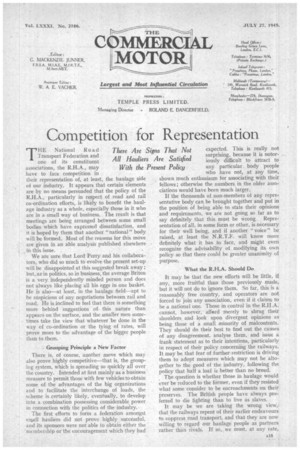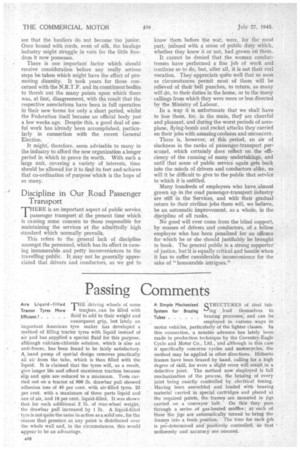Competition for Representation
Page 17

Page 18

If you've noticed an error in this article please click here to report it so we can fix it.
THE National Road Transport Federation and one of its constituent associations, the R.H.A., may have to face competition in their representation of, at least, the haulage side of our industry. It appears that certain elements are by no means persuaded that the policy of the R.H.A., particularly in respect of road and rail co-ordination efforts, is likely to benefit the haulage industry as a whole, especially those in it who are in a small way of business. The result is that meetings are being arranged between some small bodies which have expressed dissatisfaction, and it is hoped by them that another "national" body will be formed. Most of the reasons for this move are given in an able analysis published elsetvhere • , in this issue. • We are sure that Lord Perry and his collaborators, who did so much to evolve -the present set-up will be disappointed at this suggested break away ; but, as-in politics, so in business, the average Briton is a very independently minded person and does not always like placing all his eggs in one basket. He is also—at least, in the haulage field—apt to be suspicious of any negotiations between rail and road. He is inclined to feel that there is something more behind suggestions ofthis nature than appears on the surface, and the smaller men sometimes take the view that whatever be done in the way of co-ordination or the tying of rates, will prove more to the advantage of the bigger people than to them.
Grouping Principle a New Factor There is, of course, another move which may. also prove highly competitive—that is, the grouping system, which is spreading so quickly all over the country. Intended at first mainly as a business" measure to permit those with few vehicles to obtain some of the advantages of the big organizations and to facilitate the interchange of loads, the scheme is certainly likely, eventually, to develop into a combination possessing considerable power in connection with the politics of the 'industry.
The first efforts to form a federation amorigst small hauliers did not prove highly successful, and its sponsors were not able to obtain either the membership or the encouragement which they had expected. This is really not surprising, because it is notoriously difficult to attract to any particular. body -people who have not, at any time, , shown much enthusiasm for associating with their fellows ; otherwise the numbers, in the older asso ciations would have been much larger.
If the thousands of non-members of any representative body can be brought together and put in the position of being able to state their opinions and requirements, we are not going so far as to say definitely that this must be wrong. Representation of all, in some .form or other, is necessary for their Well being, and if another " voice " be raised, at least the N.R.T.F. will know more definitely what it has to face, and might even recognize the advisability of modifying its own policy so that there could be greater unanimity of purpose.
What the R.H.A. Should Do It may be that the new efforts will be little, if any, more fruitful than those previously made, but it will not do to ignore them. So far, this is a reasonably free country, and operators are not forced to join any association, even if it claims to be a national one. Those in control in the R.H.A. cannot, however, afford merely to shrug their shoulders and look upon divergent opinions as being those of a small minority of malcontents. They should do their best to find out the causes of any disagreement, analyse them, and issue a frank statement as to their intentions, particularly in respect of their policy concerning the railways. It may be that fear of 'further restriction is driving them to adopt measures which may not be altogether to the good of the industry, following the policy that half a loaf is better than no bread.
The question is whether those in haulage would ever be reduced to the former, even if they resisted what some consider to be encroachments on their preserves. The British people have always preferred to die fighting than to live as slaves.
It may be we are taking the wrong view,. that the railways repent of their earlier endeavours to suppress road transport, and that they are now willing to regard our haulage' people as partners rather than rivals. If so, we must, at any rate, see that the hauliers do not become too junior. Once bound with cords, even of silk, the haulage industry might struggle in vain for the little freedom it now possesses.
There is one important factor which should receive consideration before any really serious steps be taken which might have the effect of promoting disunity. It took years for those concerned with the N.R.T.P. and it constituent bodies to thresh out the many points 'upon which there was, at first, disagreement, with the result that the respective associations have been in full operation in Their new forms for only a short period, whilst the Federation itself became an official body just a few weeks ago. Despite this, a good deal of useful work has already been accomplished, particularly in connection with the recent General Election.
It might, therefore, seem advisable to many in the industry to afford the new organization a longer period in which to prove its worth. With such a large unit, covering a variety of interests, time should be allowed for it to find its feet and achieve that co-ordination of purpose.which is the hope of so many.
Discipline in Our Road Passenger Transport
THERE is an important aspect of public service_ passenger transport at the present time which is causing some concern to those responsible for maintaining the services at the admittedly high standard which normally prevails.
This refers to the general lack of discipline amongst the personnel, which has its effect in causing innumerable and petty inconveniences to the travelling public. It may not be generally appreciated that drivers and conductors, as we got to know them before the war, were, for themost part e imbued with a sense of public duty which, whether they knew it or not, had grown on them.
It cannot be denied that The woman conductresses have performed a fine job of work and continue so to do, but, after all, it is not their real vocation. They appreciate quite well that so soon as circumstances permit most of them will be relieved of their bell punches, to return, as many , will do, to their duties in the home, or to the many callings from which they were more or less directed by the Ministry of Labour.
In a way it is unfortunate that we shall have to lose them, for, in the main, they are cheerful and pleasant, and during the worst periods of aeroplane, flying-bomb and rocket attacks they carried on their jobs with amazing coolness and unconcern.
There is, however, at this period, an air of slackness in the ranks of passenger-transport per' sonnel, which certainly does reflect on the efficiency of the running of many undertakings, and until that sense of public service again gets back into the minds of drivers and conductors alike, so will it be difficult to give to the public that service to which it is entitled.
Many hundreds of employees who have,almost grown up in the road passenger-transport industry are still in the SerVices, and with their gradual return to their civilian jobs there will, we believe, be an automatic improvement, as a whole, in the discipline of all ranks.
No good will ever come from the blind support, by masses of drivers and conductors, of a fellow employee who has been penalized for an offence for which he or she should justifiably be brought to book. The general public is a strong supporter of justice, but it is equally critical and hostile when it has to suffer considerable inconvenience for the sake of "honourable intrigues."




















































